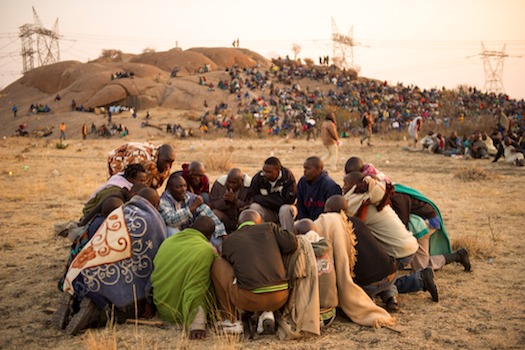- About
- Topics
- Story
- In-Depth
- Picks
- Opinion
- News
- Donate
- Signup for our newsletterOur Editors' Best Picks.Send
Read, Debate: Engage.
| July 08, 2016 | |
|---|---|
| topic: | Political violence |
| tags: | #Marikana, #police violence, #South Africa |
| located: | South Africa |
| by: | Shasha Seakamela |
Although the South African Constitution has been labelled one of the best in the world, in recent years reality sees it differently. "All animals are equal, but some animals are more equal than others", as George Orwell said in his novel Animal Farm.
It is strange that almost every year the South African Police Service is making provisions for the possibility that a third of its national budget may have to be paid out to cover for criminal and civil claims against its own members. It is clear that some of the police are without discipline. In 2015 alone about 124 police officers were linked to rape cases. Forty-two of the police officers were allegedly on duty during the rapes they were accused of having committed.
“Negligent police management, poor training, disrespect for law and order, criminal members within police ranks and blatant disregard for internal disciplinary procedures are the chief causes behind the scourge of police brutality gripping South Africa.” This was the message from renowned South African criminologists and the Independent Complaints Directorate (ICD) at a conference on police brutality and the use of force in Pretoria on Wednesday.
Talking about police in this country today, one cannot only refer to them as ‘bad apples’ anymore. The problem appears to be far bigger than just a few misbehaving individuals. The violence that our police are carrying out and their moral separation from those they patrol cannot be pinned down to the brutality of individual officers, but stems from careful policies designed by the state to mold the police into a force that could use violence to deal with the social problems. Similar to the apartheid days, today unfortunately it is sometimes the gun that prevails over common sense. One seems to notice the struggle of the police to put magnanimity and their job together.
Judging by the Marikana massacre in 2012 and the brutality of the police during the recent university students’ protests, one seems to notice the detachment from basic human rights. The fact that 34 striking miners were shot at point-blank and killed at Lonmin’s Marikana mines is a bad enough stain on this country’s history. In a live broadcast to the nation last year, President Jacob Zuma released the commission’s long-awaited report into the killings at Marikana, the worst police violence since the end of apartheid.
While Marikana should be a wake-up call to the government, South Africa’s leaders, engrossed by factional infighting, appear to be deaf. The government should in fact be blamed for the police brutality and inefficiency. What is shocking is that even today, there is no one held accountable for the killings. “How can 34 people die and no one is responsible for their deaths? That is very irresponsible of our government. I am very disappointed,” Robert Mabaso told Deutsche Welle in 2015 and added that the investigation was a waste of time and money.
The Marikana massacre jogs our memories back not even to as far as apartheid days but to the ‘shoot and kill’ speech directed to the police force made in 2008 by then Deputy Minister of Safety and Security Susan Shabangu. “I want no warning shots, you have one shot and it must be a kill shot. You must kill the bastards if they threaten you or the community. You must not worry about the regulations.”
The horror of the deputy minister’s speech shocked many of us and should have been dealt with accordingly. We know that the police do have the right to exercise certain powers when it comes to dealing with suspects, but shouldn’t these powers be exercised responsibly? One of the university students said during the protests in 2015 that, "we shouldn’t expect the police to be something they’re not".
"As history tells us, we ought to know the ruling class created the police in order to control the working class and the poor people. They’ve continued to play that role ever since."
While everyone has the rights on paper, it appears not everyone has the rights in practice.
By copying the embed code below, you agree to adhere to our republishing guidelines.
